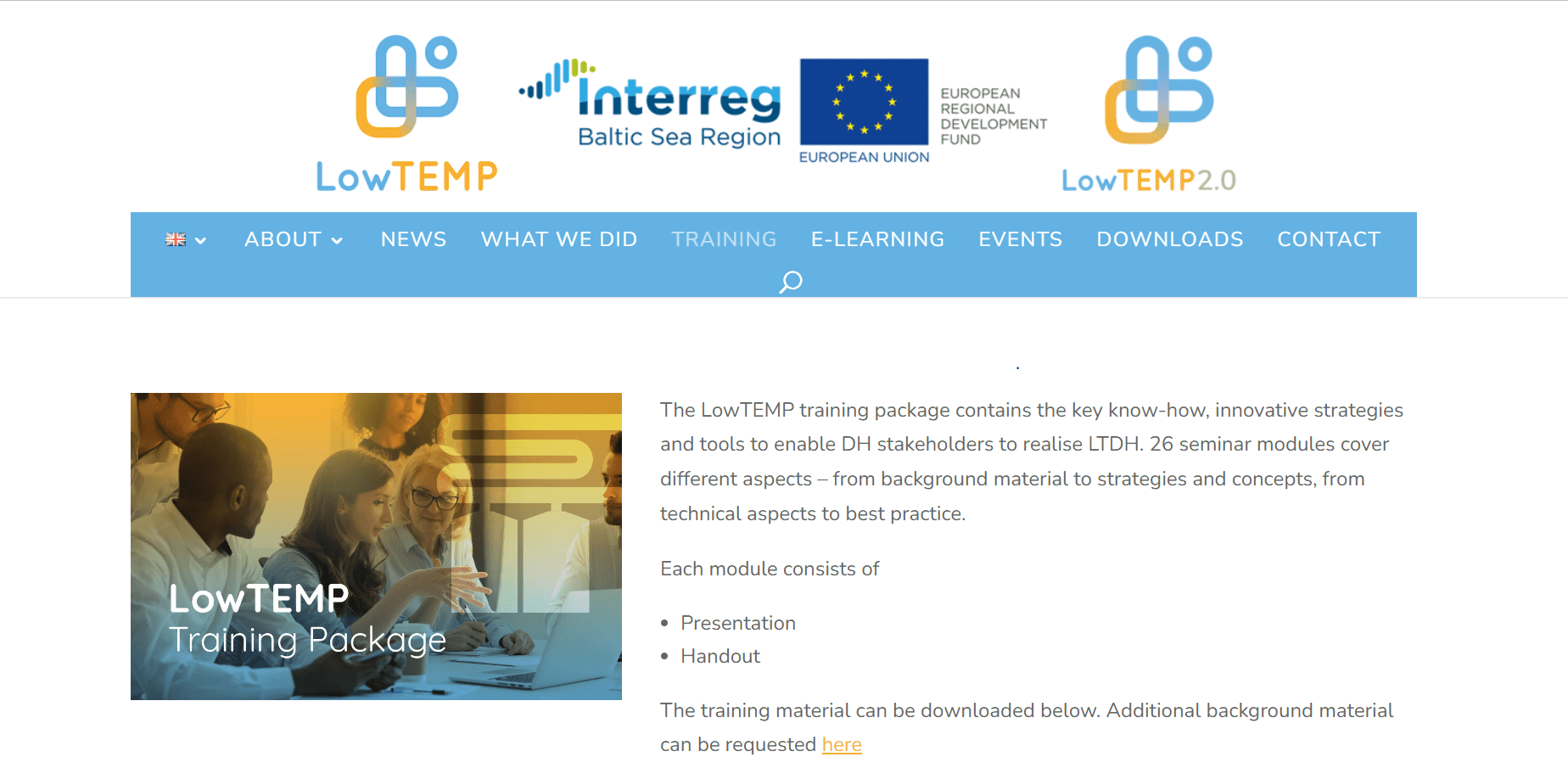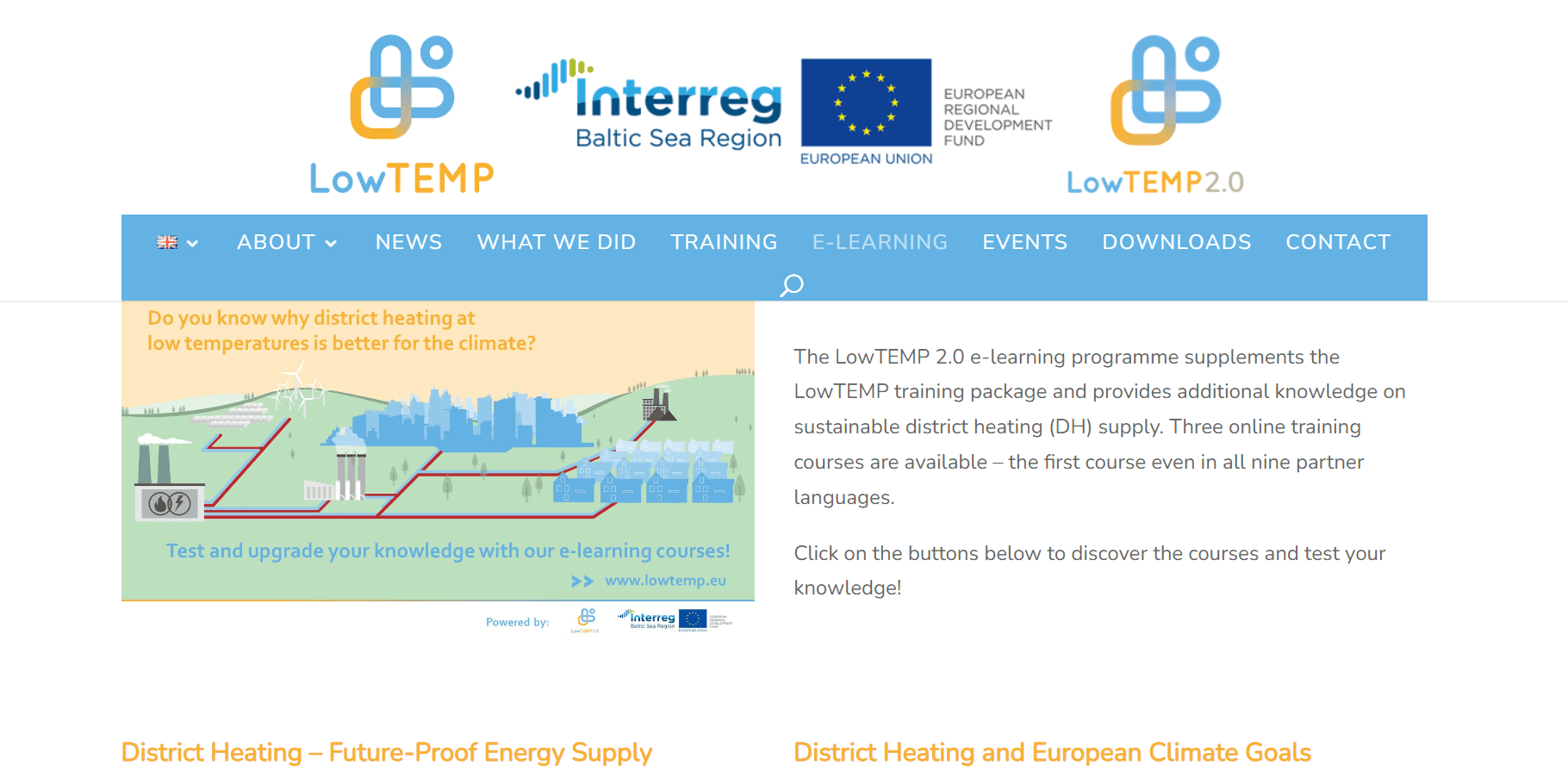LowTEMP 2.0
Modernisation of district heating systems (DHS) is in full swing in the Baltic Sea region, but more needs to be done. The potential in using low temperature district heating systems with a significant decrease in heat loss by using renewable energy and waste as heat sources is not fully unveiled. District heating systems are somehow widespread in the Baltic Sea region, but the current generation of heating grids and technologies is outdated. Furthermore, they often do not comply with latest energy efficiency standards, both in renovated or newly constructed buildings. This leads to pressing challenges such as heat energy losses, hydraulic problems and economic disadvantages.
Need for an upgrade
Therefore, district heating systems and technologies need to be adapted and upgraded in order to decrease grid heat losses and exploit synergies. The optimisation of district heating grids can be done using low temperature heat distribution. This means that supply and return temperatures should be as low as possible. The installation of low temperature grids or its integration into existing district heating systems is a challenge, in particular for economic and technical planning: investments require high upfront costs, while construction works on the pipeline system require the coordination of experts and public authorities.
As the extension phase project LowTemp 2.0 adapted the training package on Low Temperature District Heating created by its forerunner, the LowTEMP project, to the national frameworks. The project targeted municipal and regional representatives in charge of district heating as well as suppliers and energy utilities, energy agencies, planners and engineers to increase their awareness and apply the solutions.
Budgets
in numbers
-
0.68MillionTotal
-
0.51MillionErdf
-
0.04MillionEni + Russia
-
0.00MillionNorway
Achievements
Capacity building
The forerunner project LowTEMP aimed to raise awareness and strengthen capacity building as regards smart and sustainable district heating (DH) systems and strengthen the need to implement low temperature district heating (LTDH) systems in the Baltic Sea region. LowTemp 2.0 continued the efforts of its predecessor and focused primarily on training and capacity building aspects as well as the transfer to other municipalities, energy agencies, planners or DH suppliers outside the project consortium.
11 partners and 42 associated partners from local, regional and national authorities, district heating suppliers, energy agencies, research institutions, associations and SMEs from nine countries continued the cooperation, initiated by the LowTEMP project. The objective was to further contribute to building capacities in the domain of Low Temperature District Heating.
Focus on training
LowTemp 2.0 adapted the training material and translated it to the languages used in the Baltic Sea region. All modules were used in totally 29 seminars with 1116 participants from 10 countries. More than 91 hours of lecturing and discussions were held, involving various stakeholders: city administrations, policymakers, district heating companies or service utilities, technicians, students and professors, designers and architects, consultants at energy or climate agencies, municipal energy and climate planners, building managers and some others.
Outputs
Training package

E-learning programme

Project Stories
-
29.03.2021
Cooperation as the key to a climate-neutral Baltic Sea region
A common challenge for the countries in the Baltic Sea region is how to produce green and climate-neutral energy. In fact, as much as 75% of the EU greenhouse gas emissions still come from energy use and production. Cooperation and sharing good practices in Interreg projects, such as LowTEMP, Baltic Integrid and Area 21, can be a game-changer in accelerating the energy transition in the region.Read full story
Partners
Institute of Fluid Flow Machinery, Polish Academy of Sciences
- TownGdańsk
- RegionTrójmiejski
- CountryPoland
- RepresentativeAdam Cenian
- Phone
- E-Mail
- Web
atene KOM GmbH
- TownBerlin
- RegionBerlin
- CountryGermany
- RepresentativeBritta Schmigotzki
- Phone
- E-Mail
- Web
Centre for Energy, Construction, Architecture and the Environment GmbH
- TownHamburg
- RegionHamburg
- CountryGermany
- RepresentativeJan Gerbitz
- Phone
- E-Mail
- Web
Brandenburg University of Technology Cottbus - Senftenberg
- TownCottbus
- RegionCottbus, Kreisfreie Stadt
- CountryGermany
- RepresentativeLilian Senft
- Phone
- E-Mail
- Web
Sustainable Business Hub (SBHub)
- TownMalmö
- RegionSkåne län
- CountrySweden
- RepresentativeCecilia Thapper
- Phone
- E-Mail
- Web
SUCCEEDED by PP12 (contracting) CLEAN
- TownKøbenhavn V
- RegionByen København
- CountryDenmark
- RepresentativeMichael Sørensen
- Phone
- E-Mail
- Web
Thermopolis Ltd.
- TownLapua
- RegionEtelä-Pohjanmaa
- CountryFinland
- RepresentativeLea Hämäläinen
- Phone
- E-Mail
- Web
Tartu Regional Energy Agency
- TownTartu
- RegionLõuna-Eesti
- CountryEstonia
- RepresentativeMartin Kikas
- Phone
- E-Mail
- Web
Riga Technical University (RTU)
- TownRiga
- RegionRīga
- CountryLatvia
- RepresentativeFrancesco Romagnoli
- Phone
- E-Mail
- Web
ANO Energy Efficiency Centre
- TownPetrozavodsk
- RegionRepublic of Karelia
- Country
- RepresentativeAlexander Berdino
- Phone
- E-Mail
- Web
Lithuanian Energy Institute (LEI)
- TownKaunas
- RegionKauno apskritis
- CountryLithuania
- RepresentativeNerijus Pedišius
- Phone
- E-Mail
- Web
Energy Cluster Denmark
- TownAalborg Øst
- RegionNordjylland
- CountryDenmark
- RepresentativeMichael Sørensen
- Phone
- E-Mail
- Web
-
Project managerEwa DomkeInstitute of Fluid Flow Machinery, Polish Academy of Sciences
-
Legal representativeMarcin LackowskiInstitute of Fluid Flow Machinery, Polish Academy of Sciences
-
Financial managerMałgorzata OstachowiczInstitute of Fluid Flow Machinery, Polish Academy of Sciences
-
Communication managerAgnieszka WnukInstitute of Fluid Flow Machinery, Polish Academy of Sciences



